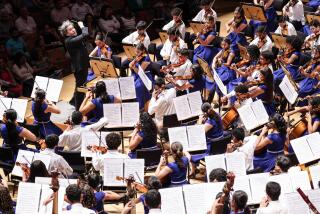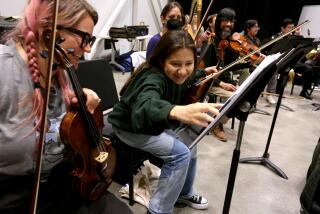Reincarnation of a storied Muscovite band
Despite the surfeit of musical styles available in todayâs America, it grows harder and harder to hear a nationalist idiom played authentically on its own.
Thatâs why the appearance of the Moscow Philharmonic on Saturday at the Orange County Performing Arts Center provoked so much drama: Would the storied band that premiered works by Dmitri Shostakovich and hosted violin deity David Oistrakh produce its superior brand of Russian authenticity after 20-plus years of undistinguished playing and the addition of young, less culturally homogenous musicians?
The question wasnât initially simple to answer after the groupâs inconsistent performance of Weberâs âEuryantheâ Overture: The strings played briskly with dynamic flair, but the tinny-sounding wind section couldnât keep up.
Still, as the concert wore on, with an authoritative performance of Brahmsâ Violin Concerto by Taiwanese American violinist Cho-Liang Lin, todayâs Muscovites proved that they werenât just a forgettable ensemble with a famous name.
In the Brahms, Linâs sweet-sounding Guarneri violin soared above the demonstrative orchestra and was only seldom tripped up by spotty intonation and a workaday solo oboist.
Accompanied by the broad, stately baton of conductor Yuri Simonov, Lin phrased tunes with breathable tempos, vacillated between aggressive chord attacks and eminently fluid bow changes, and in the process showed himself to be a less intimate performer than usual -- very Russian.
The real star of the night, however, was the orchestra of the second half. Simonovâs rendition of Rachmaninoffâs grandiose Second Symphony, an early 20th century masterwork that harks back to the czarist days of Rimsky-Korsakov and spans nearly an hour, felt about half that length as a result of the orchestraâs sumptuously textured playing, gripping brass fanfares and gradual ebbs and flows of expressive string-section intensity.
Most memorable was the passionate Adagio, a melodic love paean reminiscent of Rachmaninoffâs famous Second Piano Concerto. Here, finally, was the Moscow Philharmonic of the postwar era, players both passionate about their culture and determined to share it with as much ardor as possible.
More to Read
The biggest entertainment stories
Get our big stories about Hollywood, film, television, music, arts, culture and more right in your inbox as soon as they publish.
You may occasionally receive promotional content from the Los Angeles Times.










